
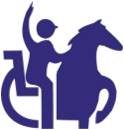
Little Bit Therapeutic Riding Center
18675 NE 106th St
REDMOND, WA 98052
Mailing Address:
18675 NE 106th St.
Redmond, WA 98052
Phone: 425-882-1554
MAKE AN INQUIRY
View our WEBSITE
EIN: 91-1012131Founded: 1976
View our PHOTO GALLERY
Profile Last Updated December 10, 2025Public Charity
Click here to view listing(s) of the program horses we are seeking

The Guardian Seal of Transparency is awarded annually to recognize an organization's commitment to transparency and accountability by their willingness to make comprehensive data about their programs, horse care practices, and governance available for public scrutiny. The Guardian Seal of Transparency is NOT an endorsement.
Last Updated: June 22, 2025
Little Bit Therapeutic Riding Center has not attained the Guardian designation for 2026.
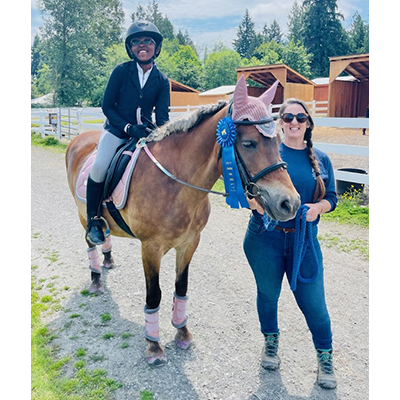
MISSION & PROGRAMS
Mission:Little Bit Therapeutic Riding Center is a community where horses transform the bodies, minds, and spirits of people with disabilities.
Our purpose is to help participants build skills for independence, improve daily functioning, and overcome physical and emotional health challenges.
Our organization conducts Equine Assisted Services in accordance with the EQUUS Foundation Guidelines on Qualifications of Organizations Conducting Equine Assisted Services (EAS).
Our organization does not provide outreach and/or public education programs involving horses.
100% of our total programs and services are equine-related.
Our organization is directly responsible for the care and shelter of equines involved in our programs.
Our organization does not CURRENTLY use satellite, overflow, foster, and/or outreach facilities.
Please describe what steps your organization takes to ensure that:
1) all interactions between your equines and people are mutually beneficial and conducted in accordance with the Guidelines for Human-Equine Interactions stated below;
2) all equines in the care of our organization and/or equines that participate in the organization's program have access to clean drinking water at all times; nutritious food in sufficient quantity, including natural forage such as pasture grass and/or hay; appropriate veterinary, farrier, and dental care; shelter and protection from the weather; sufficient safe space to move around comfortably on a daily basis; and daily opportunity to freely interact and have contact with other equines:
The wellbeing of the equine members of the Little Bit team is vital and enables them to successfully provide the high-quality services we are committed to delivering to our clients. Little Bit is committed to its Equine Standards of Care that provide the minimum care requirements of horses owned by Little Bit, these can be viewed here: https://www.littlebit.org/equinestandards
Each program horse has its own parameters set which include (but are not limited to) rider weight limits; number of mounted and/or unmounted activities a particular horse can undertake per day and per week; and the types of activities a particular horse can participate in including the location, type of tack, riding activity, and level of support from staff. As a Premier Accredited center through the Professional Association of Therapeutic Horsemanship (PATH) International, we meet or exceed PATH standards for horse care; this includes the provision of trained, certified staff members supervising all activities – who are able to stop an activity, or remove an equine from an activity, should the need arise for any reason, of which horse health is a major consideration.
Our horses are monitored for their weight, health, and body condition on an ongoing basis; their documented workload and work type is reviewed on a weekly basis by our Equine team and adjusted as necessary. The Equine team is supported by a large team of equine professionals including veterinarians, farriers and trimmers, saddle fitters, chiropractors, and bodyworkers.
We have a team of 15 barn staff, plus a large volunteer team, who, under the supervision of our Equine Director and Equine team, are responsible for day-to-day care of the horses, of which clean water is of the highest importance. Our horses’ nutritional needs are assessed based on their body weight, workload, body condition, and other factors (for example age and medical conditions such as metabolic issues), and each horse has a detailed feeding plan. We feed a minimum of three times daily and each horse has an individual feed plan including their hay amount and type, “grain” or pelleted feed such as ration balancers, and supplements. Each of our horses have a large individual paddock, with loafing shed. Some of our herd live out 24/7 and some come into the barn into a stall at night; this is based on the horse’s history and health issues, and they are housed where they are the most comfortable.
Our horses are housed in individual paddocks, which is part of our land management strategy. They can, however, interact over the fence lines. We also have some grass pastures and encourage the turnout of horses in pairs or small groups when the ground conditions are suitable.
Equine Assisted Services (EAS) Overview:
Overview of our programs involved with providing EAS to individuals with special needs:
Our primary programs include Therapy, Adaptive Riding, Equine-Facilitated Psychotherapy (EFP), and Equine-Assisted Learning (EAL).
Therapy (physical, occupational, or speech-language therapy) utilizes the movement of the horse as a treatment tool. Because the horse moves in a three-dimensional pattern like the action of the human pelvis during normal, upright movement, being on horseback helps achieve optimal spinal alignment for participants. Patients receive 30-45 minutes of weekly therapy plus 15-30 minutes of traditional therapy in our treatment rooms. All treatments are provided by a licensed therapist, assisted by one to three volunteers, a trained horse handler, and the horse.
Adaptive Riding focuses on increasing individual riding skills while gaining a therapeutic benefit. The goals set for each rider vary as much as the riders do. The individualized lesson plans consider the rider's physical, emotional, and mental strengths and limitations. Riders receive 60 minutes of weekly adaptive riding time with small groups of three to five riders per class. Each class is led by a PATH International certified instructor, and riders are assisted by one to three volunteers for safety and stability on the horse.
Equine-Facilitated Psychotherapy (EFP) and Equine-Assisted Learning involving Personal and/or Professional Development (EAL) involve partnerships with local mental health therapists to provide services at our facility. Therapists work with a staff equine specialist certified by PATH International. Horses are uniquely suited to this kind of therapy because they are intuitive and will react to behavior patterns and cues that people might miss, allowing the therapists to interact on a deeper level with their participants and address issues that might otherwise go unnoticed.
Equine Assisted Services (EAS) and Providers:
Our organization provides the following Equine Assisted Services (EAS):
Adaptive/Therapeutic Riding
Adaptive/Therapeutic Unmounted Horsemanship
Psychotherapy/Counseling
Occupational Therapy/Physical Therapy/Speech-Language Pathology
Equine-assisted Learning in Personal Development
19: Total number of Equine Assisted Service Providers at Dunmire Stables
1 Abigail Crickmore
FACILITY PARTICIPATION:
Dunmire Stables
RELATIONSHIP: Independent Contractor
SERVICES PROVIDED:
Psychotherapy/Counseling
DEGREES, LICENSES AND/OR CERTIFICATIONS
LMHC, CCTP
2 Casey Mendoza
FACILITY PARTICIPATION:
Dunmire Stables
RELATIONSHIP: Employee
SERVICES PROVIDED:
Occupational Therapy/Physical Therapy/Speech-Language Pathology
DEGREES, LICENSES AND/OR CERTIFICATIONS
State of WA Licensed Occupational Therapist
MS, OTR/L
PATH Registered Therapist
3 Christina Reyer
FACILITY PARTICIPATION:
Dunmire Stables
RELATIONSHIP: Employee
SERVICES PROVIDED:
Occupational Therapy/Physical Therapy/Speech-Language Pathology
DEGREES, LICENSES AND/OR CERTIFICATIONS
State of WA Licensed Occupational Therapist
MOT, OTR/L, C/NDT
PATH Registered Therapist
4 Devin Kubat
FACILITY PARTICIPATION:
Dunmire Stables
RELATIONSHIP: Employee
SERVICES PROVIDED:
Occupational Therapy/Physical Therapy/Speech-Language Pathology
DEGREES, LICENSES AND/OR CERTIFICATIONS
M.A. CCC-SLP
5 Devon Stone
FACILITY PARTICIPATION:
Dunmire Stables
RELATIONSHIP: Employee
SERVICES PROVIDED:
Adaptive/Therapeutic Riding
Adaptive/Therapeutic Unmounted Horsemanship
DEGREES, LICENSES AND/OR CERTIFICATIONS
PATH International CTRI
PATH International RI
PATH International ESMHL
PATH International Mentor
6 Diane Bartels
FACILITY PARTICIPATION:
Dunmire Stables
RELATIONSHIP: Employee
SERVICES PROVIDED:
Adaptive/Therapeutic Riding
Adaptive/Therapeutic Unmounted Horsemanship
DEGREES, LICENSES AND/OR CERTIFICATIONS
PATH International CTRI
PATH International ESMHL
7 Isabelle Minasian
FACILITY PARTICIPATION:
Dunmire Stables
RELATIONSHIP: Employee
SERVICES PROVIDED:
Adaptive/Therapeutic Riding
DEGREES, LICENSES AND/OR CERTIFICATIONS
PATH International CTRI
8 Jenny Slack
FACILITY PARTICIPATION:
Dunmire Stables
RELATIONSHIP: Employee
SERVICES PROVIDED:
Adaptive/Therapeutic Riding
Adaptive/Therapeutic Unmounted Horsemanship
DEGREES, LICENSES AND/OR CERTIFICATIONS
PATH International CTRI
9 Joan Myers
FACILITY PARTICIPATION:
Dunmire Stables
RELATIONSHIP: Employee
SERVICES PROVIDED:
Adaptive/Therapeutic Riding
Adaptive/Therapeutic Unmounted Horsemanship
DEGREES, LICENSES AND/OR CERTIFICATIONS
PATH International CTRI
PATH International ESMHL
BS Recreation and Leisure Studies with Therapeutic emphasis
10 Joelle Delettrez
FACILITY PARTICIPATION:
Dunmire Stables
RELATIONSHIP: Employee
SERVICES PROVIDED:
Adaptive/Therapeutic Riding
DEGREES, LICENSES AND/OR CERTIFICATIONS
PATH International CTRI
11 Kelly Doody
FACILITY PARTICIPATION:
Dunmire Stables
RELATIONSHIP: Employee
SERVICES PROVIDED:
Adaptive/Therapeutic Riding
DEGREES, LICENSES AND/OR CERTIFICATIONS
PATH International CTRI
12 Kelsie McGladrey
FACILITY PARTICIPATION:
Dunmire Stables
RELATIONSHIP: Employee
SERVICES PROVIDED:
Occupational Therapy/Physical Therapy/Speech-Language Pathology
DEGREES, LICENSES AND/OR CERTIFICATIONS
State of WA Licensed Physical Therapist
PT, DPT
PATH Registered Therapist
13 Maddy DeMaris
FACILITY PARTICIPATION:
Dunmire Stables
RELATIONSHIP: Employee
SERVICES PROVIDED:
Adaptive/Therapeutic Riding
DEGREES, LICENSES AND/OR CERTIFICATIONS
PATH International CTRI
14 Melissa Cope
FACILITY PARTICIPATION:
Dunmire Stables
RELATIONSHIP: Independent Contractor
SERVICES PROVIDED:
Psychotherapy/Counseling
Equine-assisted Learning in Personal Development
DEGREES, LICENSES AND/OR CERTIFICATIONS
State of WA Licensed Social Worker
Master of Social Work
15 Mindi Bohrer
FACILITY PARTICIPATION:
Dunmire Stables
RELATIONSHIP: Employee
SERVICES PROVIDED:
Occupational Therapy/Physical Therapy/Speech-Language Pathology
DEGREES, LICENSES AND/OR CERTIFICATIONS
PT, OTR/L
16 Sandy Jones
FACILITY PARTICIPATION:
Dunmire Stables
RELATIONSHIP: Employee
SERVICES PROVIDED:
Adaptive/Therapeutic Riding
Adaptive/Therapeutic Unmounted Horsemanship
Occupational Therapy/Physical Therapy/Speech-Language Pathology
DEGREES, LICENSES AND/OR CERTIFICATIONS
PTA
PATH Registered Instructor and Therapist
17 Sara Vowels
FACILITY PARTICIPATION:
Dunmire Stables
RELATIONSHIP: Employee
SERVICES PROVIDED:
Adaptive/Therapeutic Riding
Adaptive/Therapeutic Unmounted Horsemanship
DEGREES, LICENSES AND/OR CERTIFICATIONS
PATH International CTRI
18 Sarah Squires
FACILITY PARTICIPATION:
Dunmire Stables
RELATIONSHIP: Employee
SERVICES PROVIDED:
Adaptive/Therapeutic Riding
Adaptive/Therapeutic Unmounted Horsemanship
Occupational Therapy/Physical Therapy/Speech-Language Pathology
DEGREES, LICENSES AND/OR CERTIFICATIONS
COTA
PATH Registered Therapist
PATH Registered Instructor
19 Zoe Trager
FACILITY PARTICIPATION:
Dunmire Stables
RELATIONSHIP: Employee
SERVICES PROVIDED:
Adaptive/Therapeutic Riding
Adaptive/Therapeutic Unmounted Horsemanship
DEGREES, LICENSES AND/OR CERTIFICATIONS
PATH International CTRI
PATH International ESMHL
PATH International Mentor
WA State Certified Special Educator K-12
Research/Medical Use of Equines:
Our organization has never made, and would not ever consider making, equines available for research studies or medical training that involves invasive procedures and/or that which may cause pain or suffering to the equine.
Religious Affiliation:
Our organization does not promote religious education, religious purposes, or a specific religious faith or use donations for religious education or religious purposes; require participants to be of a certain faith; require participation in religious, instruction, activities or services; or require participation in prayer, worship, religious instruction or other religious activities as a condition of receiving social or secular services offered.
Auction Donation:
Our organization has never allowed, or would not consider allowing, an equine to be sold, transferred, released, or otherwise placed into possession of any person or organization that would cause or allow the equine to be sold at auction for slaughter.
Our Programs/Activities that are not equine-related and/or involving animals other than equines:
Our focus is on Therapy, Adaptive Riding, Equine-Facilitated Psychotherapy, and Equine-Assisted Learning. We also have one barn cat that is a big hit with the majority of our participants, and we have an Office Dog program as well. Office dogs do not interact with our horses.
POLICIES: INTAKE, ASSESSMENT & TRAINING
Prior to a horse being accepted and/or arriving at the facility, the organization has the following policies in place:The owner of a potential equine is interviewed over the phone or in person prior to seeing the equine
The equine is evaluated at its place of residence
The owner completes an application/contract which constitutes the agreement between the owner and our organization when the equine is acquired from the equine's owner other than by seizure or by abandonment
The owner is financially responsible for the shipping of the equine to and from the organization
If health records are not available or are out-of-date, our veterinarian will administer appropriate vaccinations
A health certificate signed by a veterinarian and dated no more than seven days prior to arrival is provided to our organization either prior to or upon arrival of the equine attesting to the health status of the equine
Trial Period: Check all that apply:
Equines are on trial up to 60 days
The trial period may be reduced based on the equine's progress
The trial period may be terminated by either the organization or the owner for any reason
Equines are on trial for up to 30 days
Equines are on trial for 60 or more days
During the trial period, the organization accepts total financial responsibility for the care of the equine, including board, feed, shoeing and any necessary veterinary care
During the trial period, the organization accepts financial responsibility for the care of the equine, including board, feed, shoeing and any necessary veterinary care, up to a fixed amount agreed upon by the organization and the owner
During the trial period, the owner/donor is financially responsible for the care of the equine, including board, feed, shoeing and any necessary veterinary care
Upon intake, the organization has the following quarantine policy in place:
The equine is confined to a designated and separate area for isolation and quarantine at the facility for a prescribed period of time
The equine is confined to a designated and separate area for isolation and quarantine off-site for a prescribed period of time
The equine is not quarantined
The typical length of quarantine is: 10 to 20 days
Following arrival of the equine at the facility, the following is performed:
Physical examination to include temperature, pulse and respiration by a trained staff member upon arrival
A Henneke Body Conditioning Score or other body conditioning score is assigned by a trained staff member upon arrival
Physical examination to include temperature, pulse and respiration by a veterinarian upon arrival
A Henneke Body Conditioning Score or other body conditioning score is assigned by a veterinarian upon arrival
Photographs are taken of each equine upon arrival at the facility and kept with the equine's health records
Physical examination by a farrier
Physical examination by a dentist
The equine is microchipped if the equine has not been microchipped
Horses are assessed for following skills and behaviors:
Retrieval from a pasture/paddock
Leading with a halter and lead rope
Temperament, disposition and attitude, such as rated from very calm to very high spirited
Saddling
Bridling
Lunging
Loading onto and unloading off a trailer
Mounting and dismounting
Riding at the walk
Riding at the trot
Riding at the canter
Riding by a beginner and/or unbalanced rider
Tolerance to unusual objects and loud noises
Known vices, i.e., cribbing, biting, kicking, weaving, stall walking, etc
Grooming
Tolerance to multiple handlers at the same time
Jumping
Driving (Pulling a carriage)
Bathing
Clipping
Our organization has the following policies and procedures in place pertaining to the ongoing assessment of horses in its care:
Physical examination by a veterinarian at least annually
The Henneke Body Condition score or other body conditioning score is updated at least annually by the veterinarian
Vaccinations are administered at least annually
Photographs are taken of each equine annually and kept with the equine's health records
Equines at our facility may be treated by an equine chiropractor
Equines at our facility may be treated by an equine acupuncturist
Equines at our facility may be treated by an equine massage therapist
Equines at our facility may be treated by an equine nutritionist
The Henneke Body Condition score or other body conditioning score is updated at least annually by a trained staff member
Photographs are taken of each equine monthly and kept with the equine's health records
Our organization has the following policies and procedures in place pertaining to the weight-carrying or workload capabilities of horses/equines that are ridden in our care:
Our organization evaluates the weight-carrying and workload limitations for each equine that is ridden at least annually
Our organization maintains a written record of the weight-carrying and workload limitations for each equine that is ridden
Our organization does not evaluate the weight-carrying and workload limitations for each equine that is ridden
No equines are ridden; not applicable
The following variables are considered in determining the weight-carrying and workload limitations for each equine that is ridden:
Equine age, weight, breed, body condition, fitness, balance, health and soundness
Equine conformation to include the top line, length of back, strength and width of loin, bone density (measured by the circumference of the cannon bone just below the knee)
Size, shape, condition and angle of the hooves
Participant weight, height, body proportions, balance, fitness and riding skills as well as behavioral issues and safety concerns
Weight and proper fit of the saddle and other equipment
Terrain and footing in the working environment
Duration and frequency of working sessions, as the frequency with which an equine is subjected to maximum weight carrying and/or workload
Nature and pace of work, repetitive or varied, radius of turns, degree of incline and regularity of footing when equine is subject to maximum weight-carrying capacity
Temperature and/or weather conditions
Seasonal impact on the equines' workload and weight-carrying capabilities and limitations
Our organization does not evaluate the weight-carrying and workload limitations for each equine that is ridden
No equines are ridden; not applicable
Horses provided formal training (groundwork or riding): 2-3 times per week
Additional information about our intake, assessment & training policies and practices:
When we are looking for new horses for our therapeutic riding program, we are looking for sound, healthy, well cared for horses that can be successful in our program. Prior to a new horse coming to our property, we will first review photos and video of the horse, to check its current state of health. We will then go and visit the horse at its current location, during which time we will also check for signs of health of the horse. Prior to coming to the site, the current owner of the horse must provide information on the horse's vaccination record, deworming schedule, and other health/veterinary records as requested. These are reviewed. Should the horse's medical records not be up to date or available, the horse will not be allowed onto our property.
We have the capacity to quarantine horses on property, by isolating a stall and/or paddock should one of our horses be suspect or be known to come down with an illness, for example a virus that may pose a risk to the rest of the herd. This would be set up as needed and following the advice of our veterinary team. New horses arriving on the property are quarantined for a minimum of 7 days (if they have a full health history including vaccine records and have had a pre/purchase exam/health assessment), or 2 weeks should a less complete health history be provided. All horses must have a vaccine record prior to coming to the property.
Horses arriving at our facility will be sound and in good condition so as to be viable horses for supporting our programs. Before arriving, they are checked for their body condition to make sure they are in a healthy range, but we do not formally assign a body condition score at that time.
The Henneke Body Condition scoring system includes specific schedules that do not align to our process. We tape and measure our horses and check their body conditions four times per year. This schedule is not determined by the date of arrival. This is performed by our Equine Nutritional Advisor and is used to provide quantitative information used for tracking our horses' conditions and weights. The following policy is included in our Equine Standards of Care Statement: Horses must be provided with a diet to maintain proper body condition or weight to ensure a body condition score of a minimum of 4, with an ideal range of 4.5-5.5, unless a medical condition or old age is confirmed by a veterinarian to prevent this, despite adequate nutrition.
All of our horses have a physical exam before entering our property, conducted by a Little Bit staff member. All horses have a physical exam by our vet at some point during their 30-day trial including TPR. So, all horses do receive an examination by a vet at some point within 30 days of arriving on site, but not immediately upon arrival, and all horses are examined before arrival, but not by a veterinarian.
POLICIES: BREEDING
The organization has the following policies related to breeding and stallions:Our organization does not conduct breeding of equines owned or under the care of our organization.
The main facility where our organization conducts its programs does NOT breed equines.
One or more of the facilities where our organization conducts its programs, including foster/temporary care facilities, breeds equines
One or more of the facilities where our organization conducts its programs, including foster/temporary care facilities, are permitted to house stallions
POLICIES: EUTHANASIA
The organization has the following policies related to euthanasia:Our organization will never have an equine euthanized for space
Our organization will have an equine euthanized upon the recommendation of the veterinarian if the equine is a threat to itself, other equines, or people
Our organization will have an equine euthanized upon the recommendation of the veterinarian after all reasonable treatment options have been explored
Euthanasia is done on site when possible to decrease trauma from transport
Euthanasia is done at the veterinarian's facility
Disposal of the carcass is handled within 24 hours
Our organization will never have an equine euthanized under any circumstances
The following are authorized to administer the procedure for your organization in accordance with state laws:
Veterinarian
A certified euthanasia technician
Senior staff with appropriate training
Employee of animal control shelter or humane society with appropriate training
Veterinary student under the supervision of a licensed veterinarian
Not applicable. Our organization prohibits euthanasia under any circumstances
POLICIES: RE-HOMING
View Re-homing AgreementOur organization has the following re-homing (adoption/purchase) policies and procedures in place:
All potential adopters/purchasers complete a written contract which constitutes the agreement between our organization and the new owner
Our organization will only re-home an equine to a location where another equine resides
Potential adopters/purchasers must visit our organization and be observed with the equine on site
The distance of a potential adopter/purchaser's home from our facility is a consideration for when re-homing an equine
Our organization conducts a site visit of the adopter/purchaser's facility before the transfer of the equine to the adopter/purchaser's facility
Our organization does NOT re-home an equine to first time equine owners
Potential adopters/purchasers are encouraged to do a short-term, on-site foster with the equine
Adopters/purchasers are NOT required to provide updates
Our organization has the following policies and procedures related to horses that need to be retired, are no longer able to contribute to the mission of the organization, and/or are no longer manageable:
Equines may remain at our organization for their lifetimes
Equines may be found suitable homes by our organization
Equines may be returned to their owners
In the case an equine is unmanageable and demonstrates repeated dangerous behaviors, the equine may be euthanized upon the recommendation of the veterinarian
In the case an equine is unsound and/or unhealthy and cannot be treated to relieve suffering, the equine may be euthanized upon the recommendation of the veterinarian
The organization will accept financial responsibility for equines in the current care of the organization that need to be retired or are no longer able to contribute to the mission of the organization if all alternatives have been explored to find the equine an appropriate placement and space is not available for the equine to remain at the organization.
Equines may be sent to auction
If a suitable home cannot be located within 12 months, the equine may be euthanized
The uploaded Re-homing agreement includes the following re-homing (adoption/purchase) statements:
The agreement reflects that any individual or organization in possession of the equine as of the date of the agreement and any time thereafter is bound to not sell the equine at auction for slaughter or allow the equine to be sold, transferred, released, or otherwise placed into possession of any person or organization that will cause or allow the equine to be sold at auction for slaughter.
The agreement states that re-homed equines cannot be bred
The agreement states that the re-homed equine CANNOT be sold, adopted, transferred, auctioned, released, given away, or otherwise placed into the possession of another individual or organization under any circumstances and must be returned to our organization should the adopter decide that he/she is no longer able, or no longer wishes, to care for the equine.
The agreement states that should the adopter decide to re-home the equine, the adopter must grant the organization first right of refusal prior to the equine being placed into the possession of any individual or organization intending to take possession of the equine for any reason.
The agreement states that should the adopter decide to re-home the equine, our organization must be notified of the name, address, and telephone number of any individual or organization intending to take possession of the equine for any reason prior to the equine being placed into the possession of such individual or organization.
The agreement states that should the adopter decide to re-home the equine, our organization must grant approval of any individual or organization intending to take possession of the equine for any reason prior to the equine being placed into the possession of such individual or organization, including being provided written notification of the name, address, and telephone number of any individual or organization intending to take possession of the equine for any reason.
The agreement states that the terms of our organization's agreement will be binding on any future individual or organization taking and/or in possession of the equine for any reason.
The agreement states that if there is any breach of contract the equine must be returned to our organization
The agreement states that our organization reserves the right to make unannounced visits
The agreement states that our organization reserves the right to make scheduled visits
The agreement states that adopters/purchasers can return an equine to our organization free of charge
The agreement states that adopters/purchasers can return an equine to our organization for a fee
The agreement states that adopters/purchasers are required to provide updates (photos, vet records) for one year
The agreement states that adopters/purchasers are required to provide updates (photos, vet records) for two years
Our organization microchips all equines that are not already microchipped before the adoption and/or transfer of the equine if the organization has the authority to microchip the equine.
The agreement includes the microchip number of the equine.
The agreement states that adopters/purchasers are required to provide updates (photos, vet records) for as long as the adopter/purchaser is responsible for the care of the equine
None of the statements are included.
The organization does not re-home equines under any circumstances; our organization retains custody of our equines and ensures care of the equines for their lifetimes.
Our organization does not have the authority to transfer ownership and/or does not own any of the equines involved with our programs.
Our organization requires references from the following:
Not applicable or no references required.
Veterinarian
Farrier
Personal/Other
Transfer of ownership occurs: Immediately (at the time of adoption/purchase) or less than one year
The average equine re-homing (adoption/purchase) fee received by your organization:
$1,001 to $1,500
Additional information about our rehoming policies and practices:
Once a decision is made to retire a horse from the program, care will be taken to place that horse in a suitable home with knowledgeable individuals able to provide appropriate care. Finding that home will take priority over selling the horse. Horses may be rehomed for $1 if this is the best option, however we also will rehome horses at market rates, although we are flexible on this prioritizing the right home with appropriately skilled new owners.
Should physical or behavioral issues dictate that a horse cannot safely be rehomed, Little Bit will determine if placement in a full care facility with frequent staff visits, or humane euthanasia is most appropriate. Horses retired from the program will not be taken to any type of auction.
EQUINE CARE & SHELTER/FACILITY INFORMATION
Our organization does not CURRENTLY use satellite, overflow, foster, and/or outreach facilities.Total facilities at which our organization cares for and shelters horses used in our programs: 1
Dunmire Stables
18675 NE 106th St Redmond WA 98052
Currently operational
Total number of horses/equines currently involved with your programs, under your care, and/or owned by your organization at this facility: 32
Total number of horses at this facility NOT INCLUDING those counted above: 0
Maximum capacity of horses at this facility: 39
Does your organization own, lease or use a part of this facility? Own
Provide the contact information for the individual or organization responsible for investigating abuse in the county where the facility is located, including mailing address, email address, and phone information.
Regional Animal Services of King County (RASKC) 21615 64th Ave. S. Kent, WA 98032 206-296-7387 General email: pets@kingcounty.gov Tim Anderson, Head of the RASKC Tim.Anderson@kingcounty.gov
Does your organization conduct Equine Assisted Services (EAS) at this facility in accordance with the EQUUS Foundation Guidelines on Qualifications of Organizations Conducting Equine Assisted Services (EAS)? Yes
Total number of Equine Assisted Service Providers AT THIS FACILITY, including instructors, specialists, therapists, counselors, coaches and/or facilitators (full-time, part-time, volunteer, independent contractors, and/or providers accompanying clients) that conduct Equine Assisted Services (EAS) in accordance with the EQUUS Foundation Guidelines on Qualifications of Organizations Conducting Equine Assisted Services (EAS) AT THIS FACILITY: 19
Equine Assisted Service Providers Assigned to this Facility: (see Equine Assisted Service Provider Section below for details)
1. Abigail Crickmore
2. Casey Mendoza
3. Christina Reyer
4. Devin Kubat
5. Devon Stone
6. Diane Bartels
7. Isabelle Minasian
8. Jenny Slack
9. Joan Myers
10. Joelle Delettrez
11. Kelly Doody
12. Kelsie McGladrey
13. Maddy DeMaris
14. Melissa Cope
15. Mindi Bohrer
16. Sandy Jones
17. Sara Vowels
18. Sarah Squires
19. Zoe Trager
Veterinarian Information: Dunmire Stables (*Main) Currently operational
Veterinarian: Brandon King
Clinic Name: Pilchuck Veterinary Hospital
11308 92nd ST SE
Snohomish WA 98290
Phone: (360) 568-31
Grounds: Dunmire Stables (*Main) Currently operational
Total acreage dedicated specifically to the horses: 9
Our organization has use of the following at this facility:
Structures/Barns: 1 Run-in sheds: 35
Pastures: 4 Paddocks/Pens/Turnout Areas: 39
Uncovered Outdoor Rings: 1 Covered Outdoor Rings: 1 Indoor Rings: 2
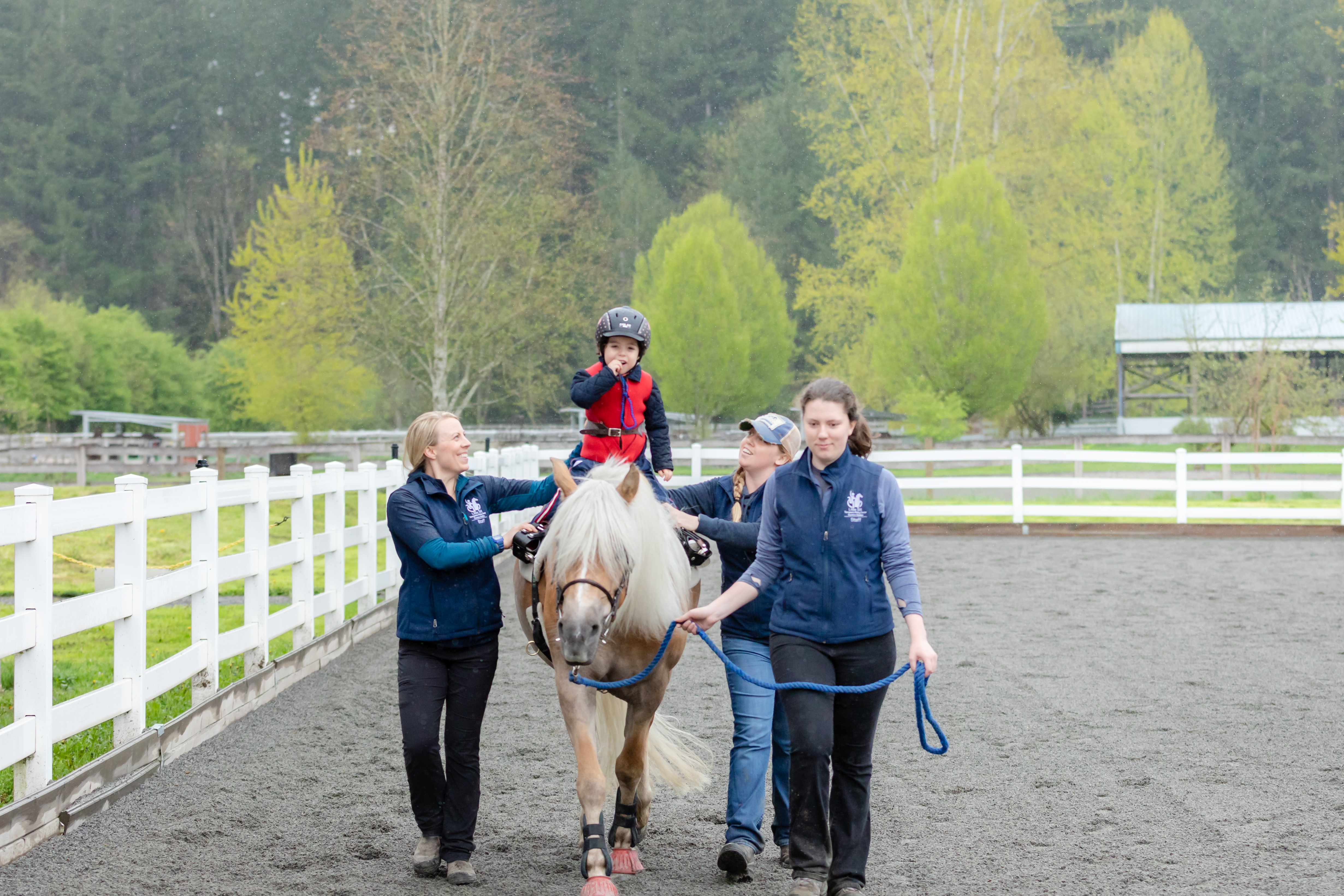
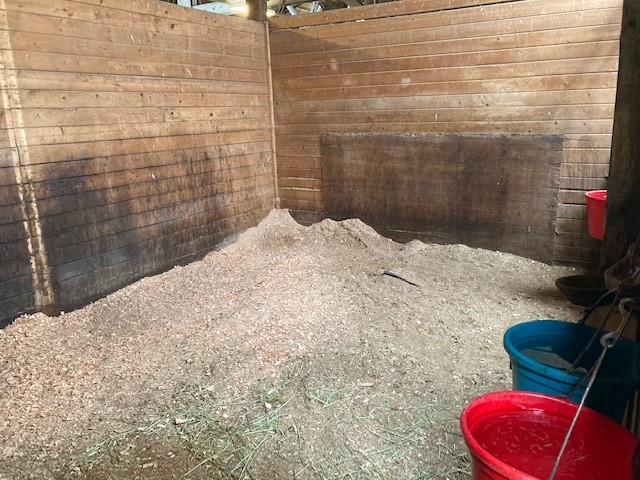
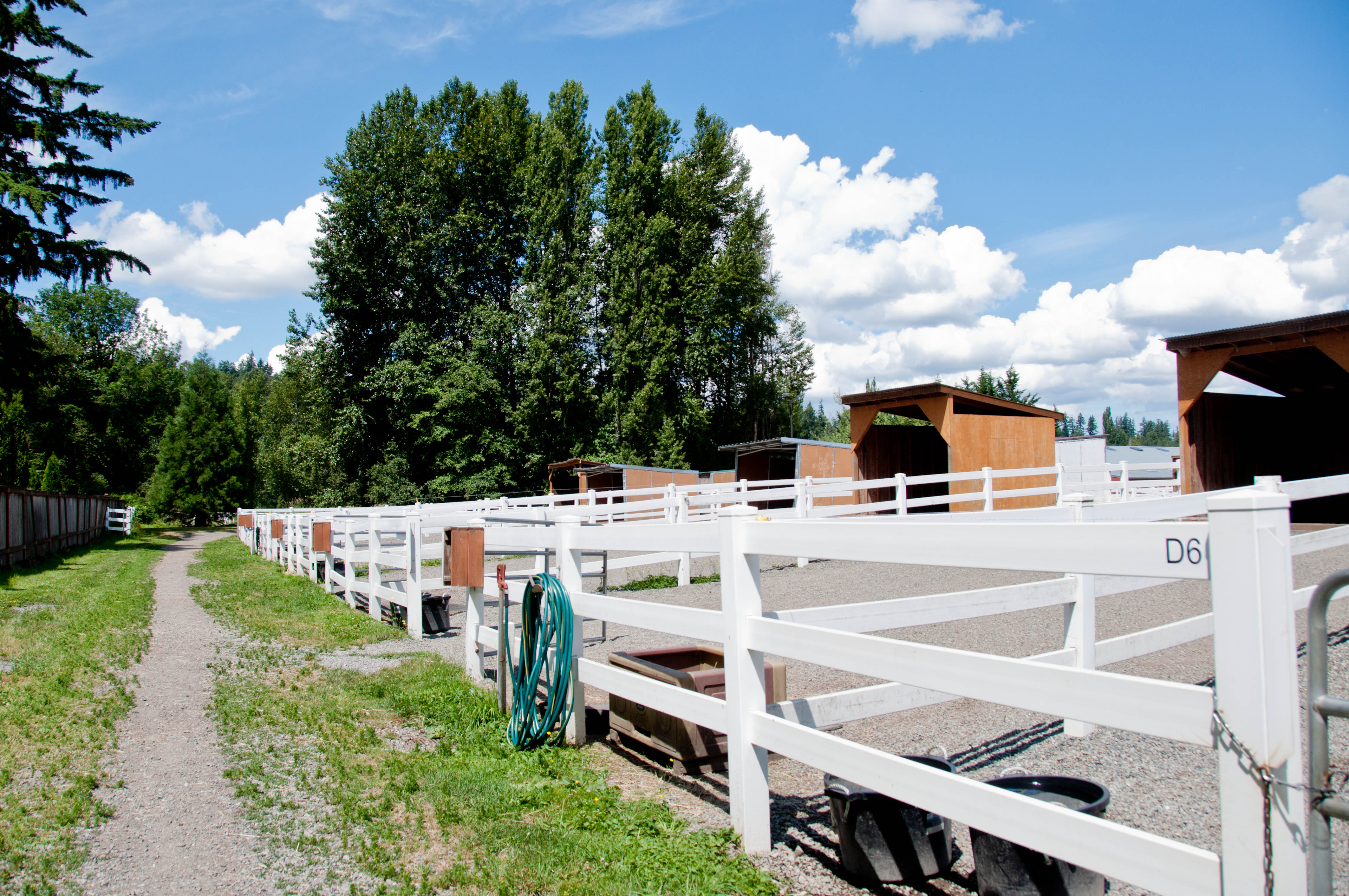
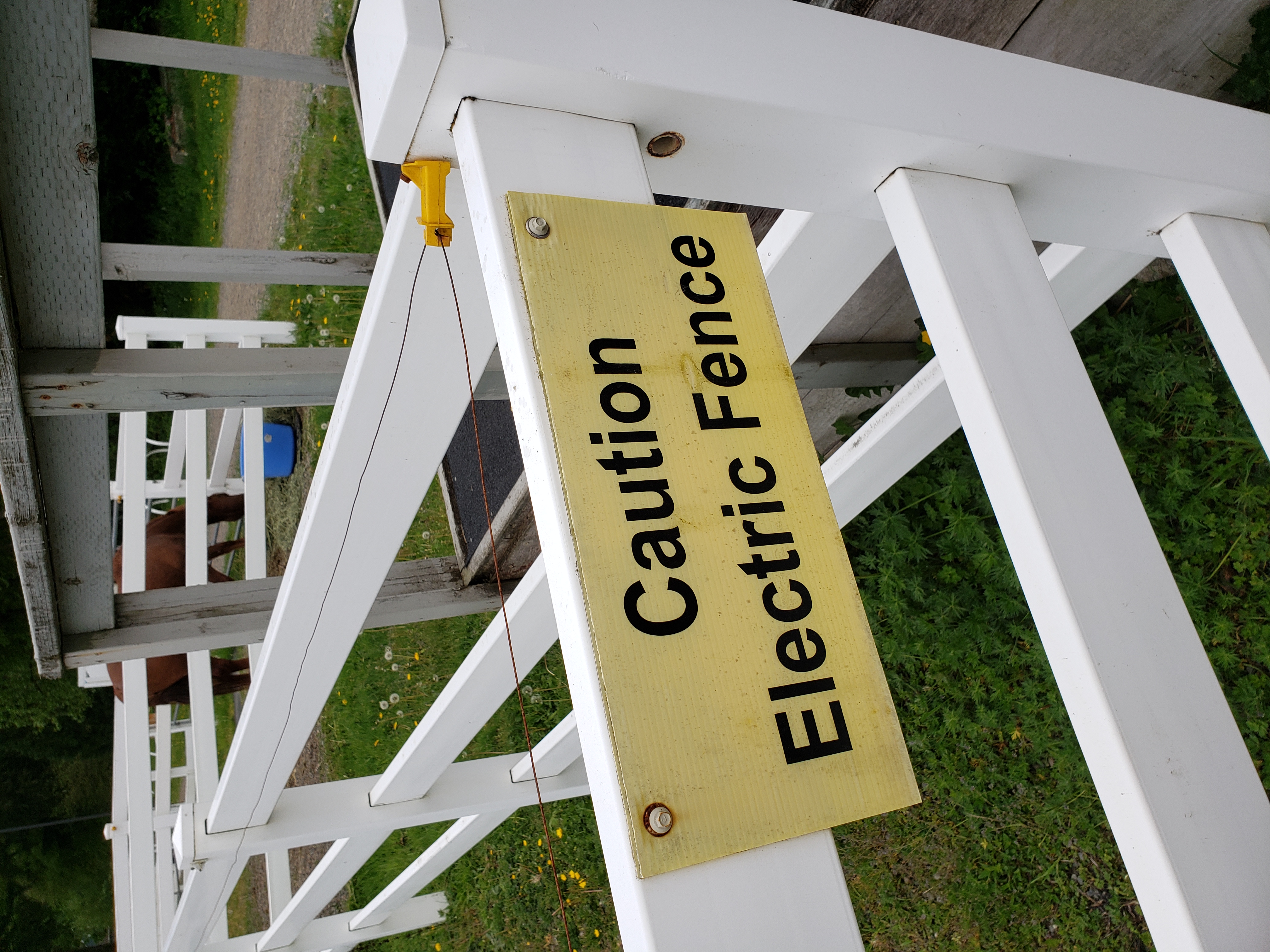
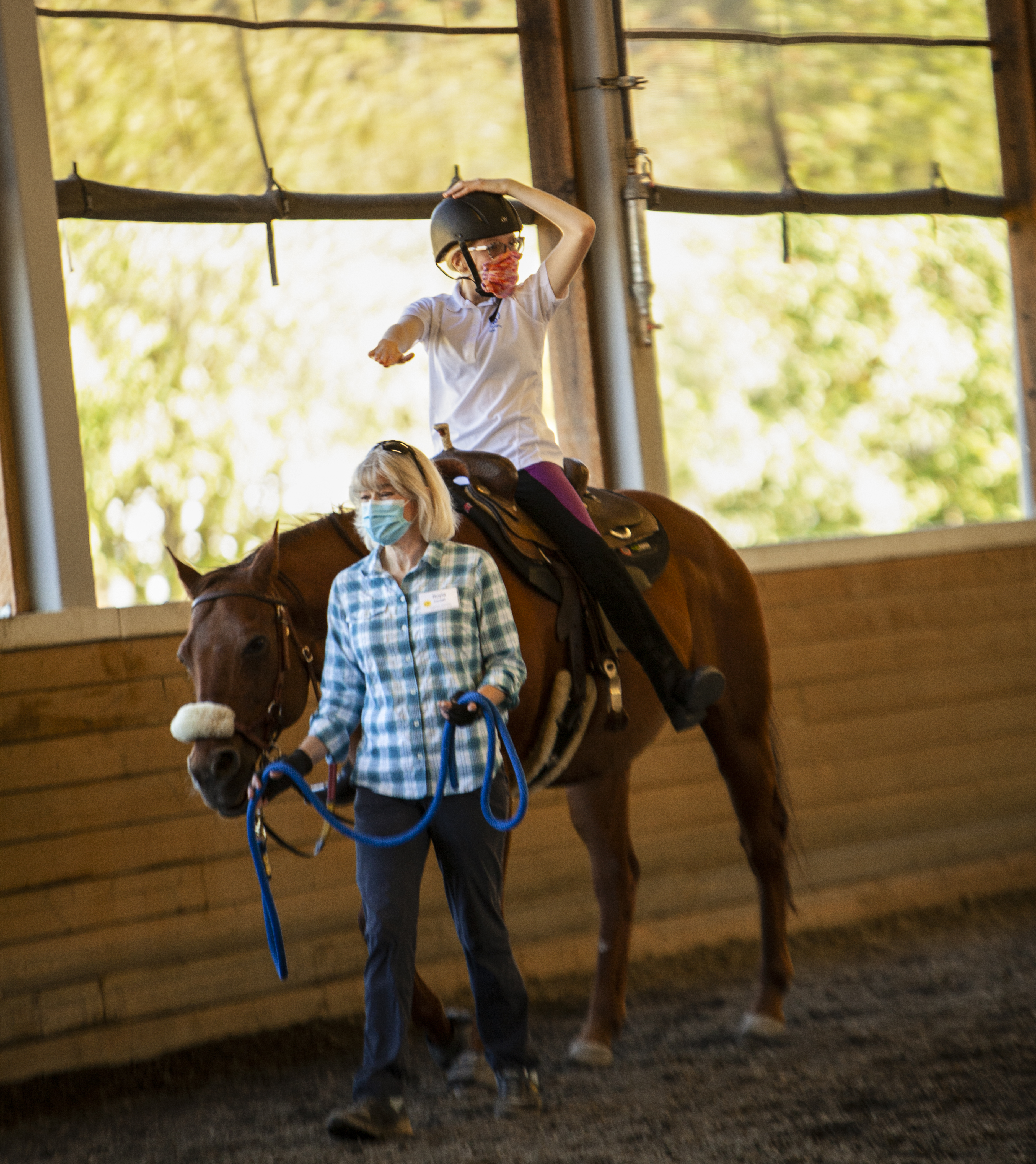
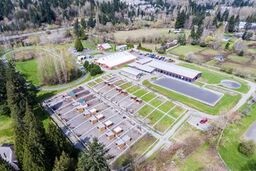
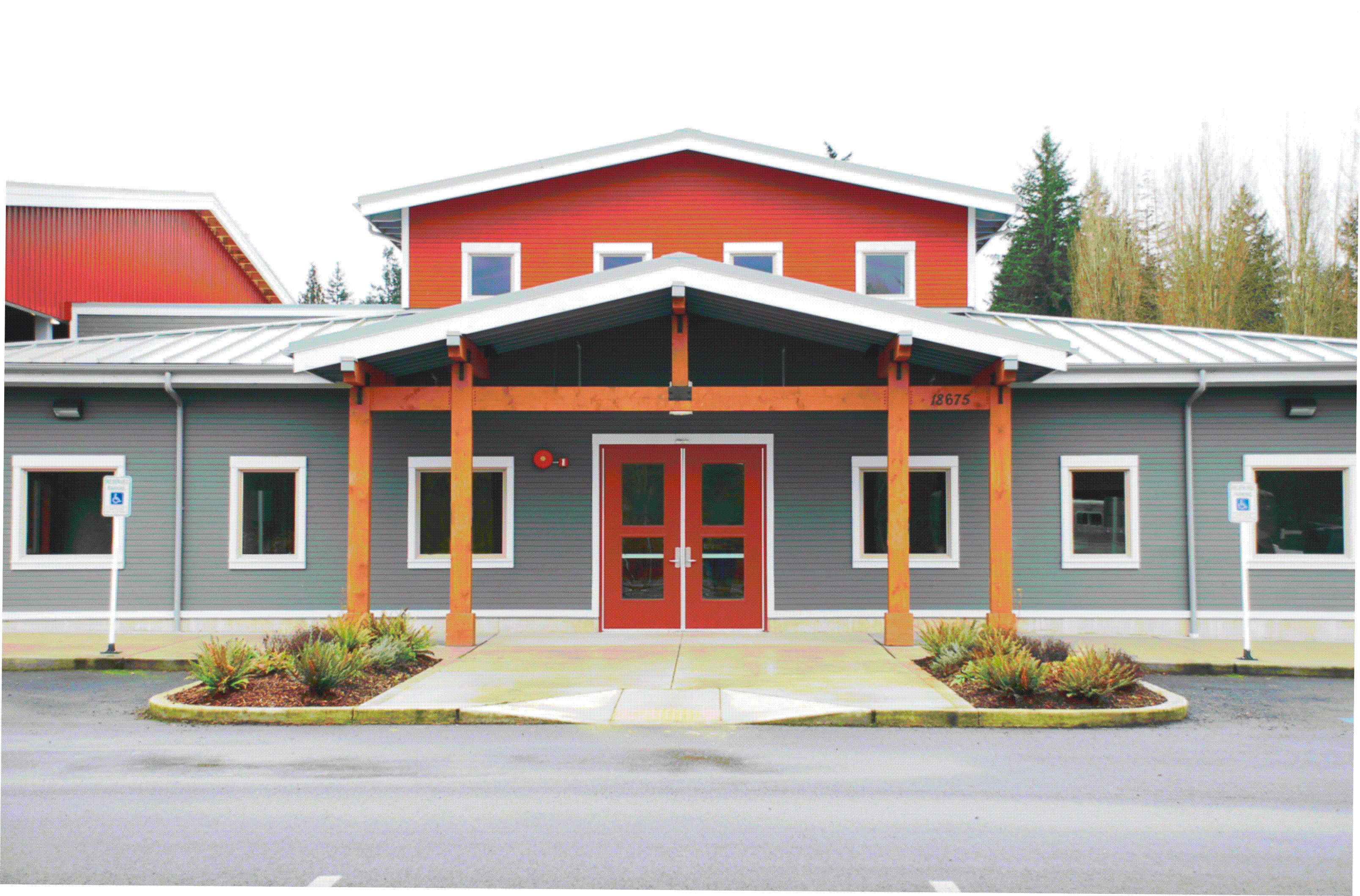
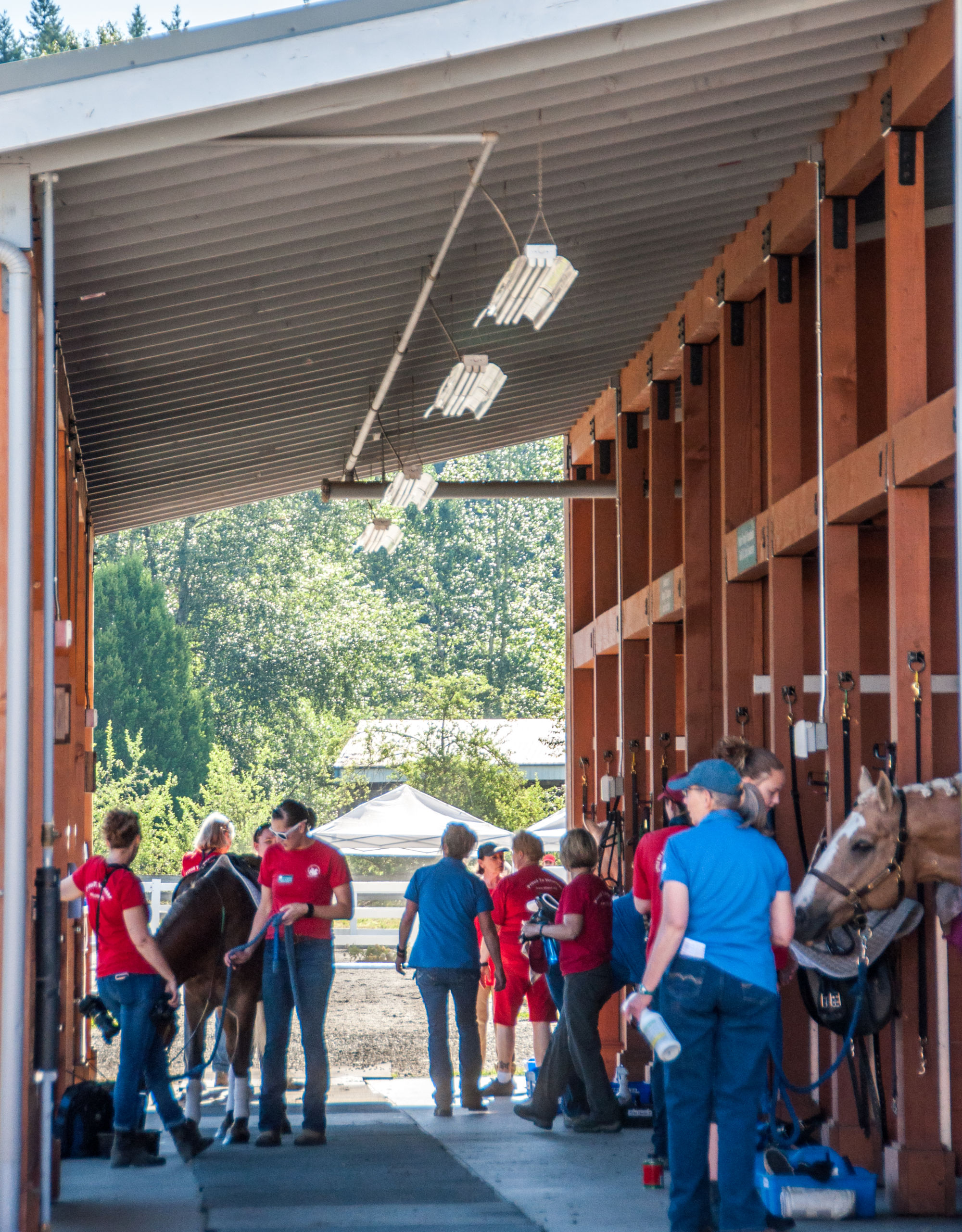
Are the organization's rules, restrictions and warnings (signage) conspicuously posted in easily accessible locations? Yes
Are the organization's emergency contacts, including veterinarian contact information, conspicuously posted in easily accessible locations? Yes
Are human and equine first aid kits easily accessible? Yes
Regarding all shelters where horses are housed including run-in sheds:
Do horses have assigned stalls in the barn/structure(s) or exclusively assigned shelter locations where they are separated from other horses with a barrier? Yes
How many hours per day, on average, are horses stalled or restricted to these sheltered exclusive shelter locations? 13-16
How often are the stalls/shelters cleaned, i.e., kept in good repair and free of standing water, accumulated waste, sharp objects and debris? 6-7 Days a Week
Do all stalls/shelters allow horses to lie down, stand up and turn around and provide protection from inclement weather (wind, sleet, rain, snow and extreme temperatures)? Yes
Are stalls/shelters kept in good repair, with adequate ceiling height, and free of standing water, accumulated waste, sharp objects and debris? Yes
Are floors constructed and maintained for both good drainage and traction? Yes
Is there a ventilation and circulation system in place to allow free flow of air to control temperature, and humidity, and to prevent air stagnation? Yes
Is wiring inaccessible to horses and maintained for safety in all areas of facility? Yes
Are fire prevention/protection measures (fire alarms, extinguishers and sprinkler systems) maintained and in good working order? Yes
Is there adequate lighting to ensure safety in all areas of facility? Yes
How many hours per day, on average, are horses turned out:
Equines are out 4 to 8 hours per day
Equines are out 9 to 15 hours per day
The following describes the pastures at this facility:
A dedicated staff person(s) is responsible for pasture management
All pastures are fenced to prevent escape or injury
Electric fencing is used; electric wires or tape fence are visibly marked
Fencing checks, such as broken or missing planks, loose fence posts, exposed or loose nails, detached wires, etc., are done regularly
Pastures are rotated
This facility does not have pastures where equines can graze on pasture grass
This facility has a written plan in place for pasture management, which includes guidelines for seeding, fertilizing, irrigation, mowing, dragging, harrowing, manure removal, removal of debris, the control of poisonous plants, and a schedule for cleaning
Barbed wire is used for fencing
Pastures have natural protection for equines (i.e., trees)
Pastures have man-made protection for equines (i.e., shelters)
The following describes the turnout areas other than pastures at this facility:
This facility has a written plan in place for the maintenance of turnout areas, which includes a schedule for cleaning, manure removal, and dragging
A dedicated staff person(s) is responsible for the maintenance of turnout areas
All turnout areas are fenced to prevent escape or injury
Electric fencing is used; electric wires or tape fence are visibly marked
Turnout areas have man-made protection for equines (i.e., shelters)
Fencing checks, such as broken or missing planks, loose fence posts, exposed or loose nails, detached wires, etc., are done regularly
This facility does not have turnout areas
Barbed wire is used for fencing
The following policies and procedures are in place at the facility to restrict public access and to keep horses safe:
The property owner, staff member or caretaker lives on the premises and ensures that public access is restricted and is responsible for the security of the facility and equines
There is a mechanism in place to monitor equines overnight
No Trespassing signs are posted
Authorized Personnel Only signs are posted
Entrance gates are locked at night
Visitors are only permitted at specific times
Visitors are only permitted in specific areas
The property is fitted with motion lights
The perimeter of the property is fully fenced
A security guard is present at night
By Appointment Only signs are posted.
Hold Harmless signs are posted
The property is fitted with a security system monitored by police or a professional service
The property is fitted with a security system that is monitored internally by staff (or the property owner)
Equine Care/Emergency Preparedness: Dunmire Stables (*Main) 2026 and 2025 This section is required.
Horse Health Care/Barn Management Records: What system is used to collect and store health/horse care records?
Notebook or equivalent (technology not utilized)
Onsite computer with onsite backup storage system
Onsite computer with cloud-based backup storage system
Our organization utilizes a software application to maintain records
The organization utilizes its own system to maintain records
The following items are consistent with our feed management plan and practices:
Equines are provided with individualized feeding plans, including supplements, according to the equine's age, breed/type, condition, size, work level and any health issues, consisting of nutritious food provided in sufficient quantity and access to adequate natural forage, or be fed daily, or as recommended by the organization's veterinarian
Feed plans are determined in consultation with a veterinarian
Supplement plans are determined in consultation with a veterinarian
Equines are fed grain in individual stalls
Staff and/or volunteers are trained in proper feed measurements and protocols and observed periodically to ensure they are feeding correctly
The feed chart is centrally located and updated as needed
The area(s) where hay, feed, grain, and supplements are stored are kept clean, free of debris and chemicals, and protected from weather and other animals in rodent-proof and mold-proof containers and grain bins
Feed, supplements and hay types are clearly labeled
Water sources, i.e., buckets, troughs, automatic waterers, etc. are kept clean, free of contaminants, debris and chemicals, protected from weather and other animals, and be positioned or affixed to minimize spillage.
Medications are kept in a secure area
Equines are fed grain in groups
Is clean, potable water available at all times for all equines? Yes
Hoof Care: How often is hoof care provided for each equine? Every 4-8 weeks and when an issue arises
Dental Care: How often is dental care provided for each equine? Annually and when an issue arises
Horse checks: How often are equines visually and physically checked by personnel at the facility? Every day or 6 days a week
Our organization has the following parasite and fly/insect control protocols in place, including remedies used to control flies and insects:
Our organization follows the parasite control guidelines of our veterinarian, including fecal testing and de-worming
Fly/Insect Control Remedies:
Fly parasites
Feed Through Products
Fly Traps and Tapes
Fly Spray Repellent
Fly Masks
Fly Sheets
Fans
The following represent the biosecurity practices in place at facility:
Our organization follows the biosecurity guidelines of our veterinarian
Sick, affected and/or quarantined equines do not have contact with other equines or other animals
The organization has a written biosecurity plan
Staff are trained in best practices related to biosecurity
Volunteers are trained in best practices related to biosecurity
A specific individual is trained and assigned to care for sick, affected and/or quarantined equines
Sick, affected and/or quarantined equines are cared for last if the caretaker must also care for healthy equines
Restricted access signs are posted at primary points of access to sick, affected and/or quarantined equines
Hand sanitizers are available at all primary points of access to sick, affected and/or quarantined equines
Footbaths are available at all primary points of access to sick, affected and/or quarantined equines
Manure and bedding from sick, affected and/or quarantined equines is removed from the facility - not put in open air piles, and not spread on pastures
Quarantine areas, such as stalls, aisle ways, paddocks, and common areas, are cleaned (and needed, disinfected) after conclusion of the quarantine.
Trailers/vans used by sick, affected and/or quarantined equines are cleaned and disinfected after each use and cleaning takes place away from where equines are sheltered
Equipment used by sick, affected and/or quarantined equines is not shared
Equipment used by sick, affected and/or quarantined equines is cleaned of organic debris and disinfected after each use
Latex gloves, or equivalent gloves, are worn when working with sick, affected and/or quarantined equines
Equines are not quarantined on arrival.
Additional information on biosecurity:
In the event of a biosecurity risk, a specific written biosecurity plan is developed based on the nature of the risk at the time. This is done in consultation with our veterinary team.
The following represent the manure removal practices in place at facility:
Manure is stored in dumpster(s)
Manure is piled in an area where equines are not located
Manure is hauled, sold or given away
Our organization adheres to the manure management guidelines set by the state, local authorities, and/or our organization's veterinarian
Manure piles are covered
Manure piles are composted or spread on pastures
The following steps are taken to help staff and volunteers readily identify each horse on the property:
Equines are assigned the same exclusive stall/shelter location each day
Name plates are located on the stall/shelter location
Photos are located on the stall/shelter location
Equines wear halters with nametags
A notebook or binder with photos and information on each equine is easily accessible
A map/diagram is posted showing the location of each equine with equine names and photos
Equine photos and profiles are available on the website
Staff and volunteers are provided with an information packet with equine profiles, including photos and detailed descriptions
Team leaders work with new staff/volunteers until they are able to identify the equines
Staff/volunteers are provided training on conformation, markings, colors, and breeds
Our organization has the following policies and procedures in place pertaining to tack, apparel and equipment:
Saddles are shared
Blankets, sheets and turn out apparel are fitted and utilized for each equine appropriate to the equine's needs and the weather conditions
Blankets, sheets and turn out apparel are cleaned regularly as needed
Riding Tack is cleaned only when needed
Riding Tack is inspected for overall working condition before each use by trained personnel
Riding Tack is assessed for fit before each use by trained personnel
Riding Tack is assessed for fit by trained personnel when an equine's body condition changes
Riding Tack is assessed for fit by trained personnel when an equine's disposition changes
This facility enlists the services of a professional saddle fitter at least once a year
Assigned riding tack is clearly labeled
Riding Tack is stored in a climate-controlled location
Helmets are shared
Helmets are cleaned/disinfected after each use
Helmets are replaced after a fall
Helmets are replaced at least every five years.
All equines have specifically assigned apparel, equipment and tack (saddles/bridles if ridden) that is not shared
Saddle pads are shared
Bridles are shared
Bits are shared
Blankets are shared
Sheets are shared
Turnout apparel is shared
Halters are shared
Riding Tack is always cleaned after each use
Riding Tack is always cleaned at least weekly
No equines are ridden; saddles, bridles, etc. not applicable.
Emergency Preparedness: Dunmire Stables: *Main This section is required.
The following plans, policies, and procedures are in place at the facility to handle emergencies and address weather related issues, fire safety procedures, and/or any additional hazardous scenarios the facility could potentially experience:
Emergency procedures are posted prominently
The facility owns or has access to a generator
The facility maintains at least two weeks of hay, feed, shavings and medications
The facility collects and maintains medical information from staff, volunteers, and clients
The facility maintains appropriate liability and/or workers' compensation insurance
The organization has a written emergency preparedness/safety plan (EPP)
Local fire department and/or the state's emergency planning department procedures
Medical emergencies for clients, staff, and volunteers
Medical emergencies for equines
Evacuation plans
Power outages
Fire
Natural Disasters - thunderstorm, hurricanes, earthquakes, tornados, etc
Protocols to notify emergency personnel
Building/facility exit plans
Terrorist attacks
The facility follows the specific procedures to help PREVENT emergency situations:
Smoking is strictly prohibited
NO SMOKING signs are posted prominently
Hay is stored away from permanent or temporary structures where equines are stalled
Permanent or temporary structures where equines are stalled are kept free of dust, cobwebs, trash, cleaning rags, and other flammable items
Aisles and doorways are kept clear
Heaters with automatic shutoff settings are used
How often are the following checked or performed?
Fire Extinguishers are checked: Annually
Smoke detectors are checked: Annually
Fence lines are checked: Daily
Turnout Areas are checked: Daily
Sprinkler systems are checked: Semi-annually
Fire drills are conducted: Not at all/NA
Review of safety protocols with staff are conducted: Annually
Review of safety protocols with volunteers are conducted: Annually
The Emergency Preparedness Plan is reviewed and updated: Annually
Equine Transportation: 4= Onsite: 1 (1 + 0) + Offsite: 3
2-horse van/trailer with truck:
2 Access offsite;
3-horse van/trailer with truck:
1 Owned onsite 1 Access offsite;
© Copyright 2018 EQUUS Foundation 548 3.00